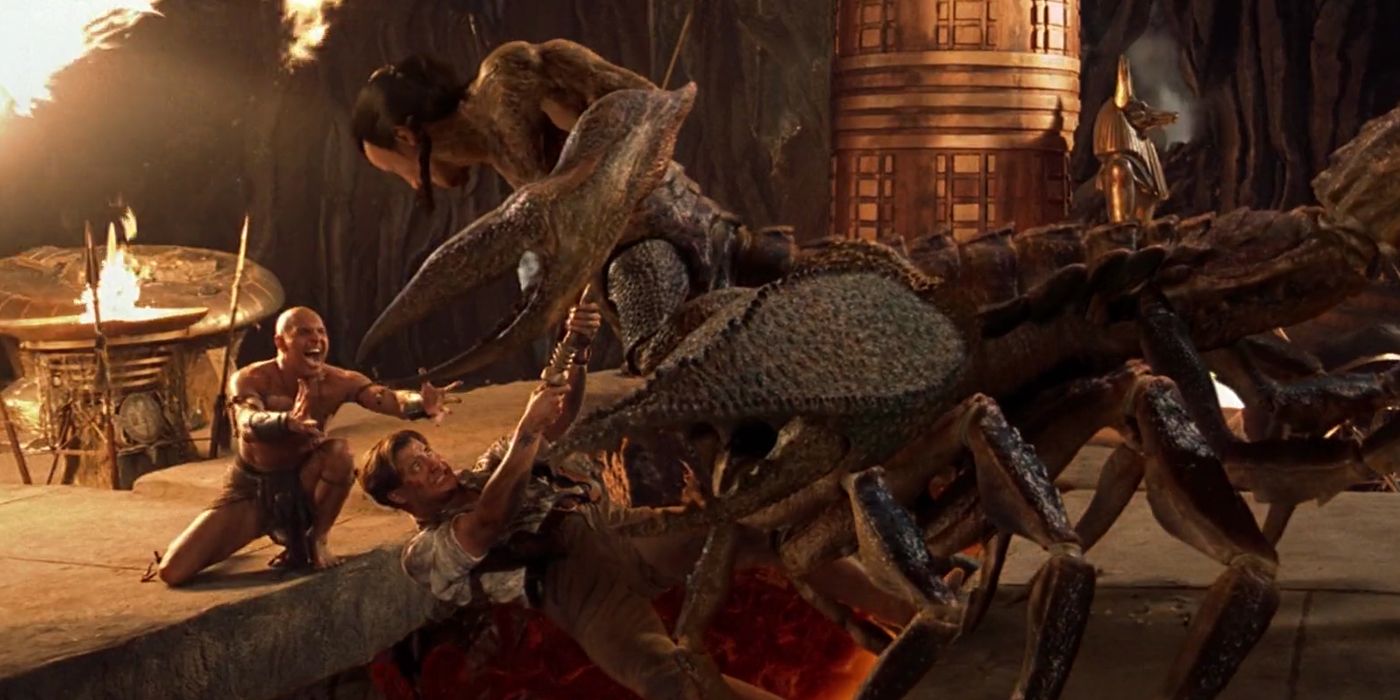
The Mummy Returns VFX artist Alex Laurant has defended the infamous Scorpion King effects used on Dwayne Johnson. The Mummy Returns is the 2001 sequel to the wildly successful The Mummy. The film brings back stars Brendan Fraser and Rachel Weisz, adding Dwayne "The Rock" Johnson as new villain the Scorpion King (who is getting his own reboot). Both The Mummy and The Mummy Returns were praised for their innovative visual effects at the time of their making.
While The Mummy films do feature many groundbreaking visual effects that still hold up today, one shot in particular has not aged quite so gracefully, and has often found itself the subject of ridicule in certain circles of the internet. The shot in question features the Scorpion King, in his half-man, half-scorpion form, bursting through a set of wooden doors. While many components of the shot are arguably still effective, the video game-like facial animations on Johnson leave much to be desired.
In a new video from the popular Corridor Crew YouTube channel, also known for their work re-creating a pivotal Luke Skywalker scene from The Mandalorian, visual effects artist Alex Laurant has addressed the heavily criticized scene. Laurant worked as a Senior Visual Effects Art Director & Concept Artist on The Mummy Returns, and joined the show's hosts to discuss his past work, including the infamous Scorpion King sequence. Laurant said that, while audiences can't look back at VFX shots from the 1990s and early 2000s and expect them to hold up to today's standards, it's true that the facial capture technique they used for Johnson's character was "underdeveloped". Of the scene, Laurant said:
"We all knew that this was falling short of what we would like it to be. When you're confronted with a situation like this, where you're best hopes and dreams aren't quite panning out, it might time to call for the old 'less is more.'"

"Less is more," in this case, meant hiding as much as the production team could through the lighting in the scene. "I feel like there's a big attempt to help lock him into the scene by having a lot of really dynamic lighting all around him," said co-host and Founder of Corridor Digital, Niko Pueringer. Laurant agreed and went on to say that, despite the scene's shortcomings, he is still "super proud of the work of the animation team and the art department."
Even with today's impressive technology and hardware, facial animation remains a monumentally difficult task for VFX artists. People are used to seeing real faces, complete with all their nuances and complex structures at work, and so recreating them digitally often leads to an effect known as the "uncanny valley." Essentially, when faced with a realistic reconstruction of a human face, digital or otherwise, viewers can tell that it's just slightly off. More recently, audiences have seen highly advanced VFX facial animations at work in films like Furious 7 with the digital reconstruction of the late Paul Walker, and Rogue One: A Star Wars Story, featuring the recreation of a young Princess Leia. While the VFX technology being used today vastly outperforms that which was used for The Mummy Returns, rendering realistic and convincing facial animations remains one of the biggest feats for artists today.
Source: Corridor Crew/ YouTube
from ScreenRant - Feed https://ift.tt/3gxlLFy


0 Comments